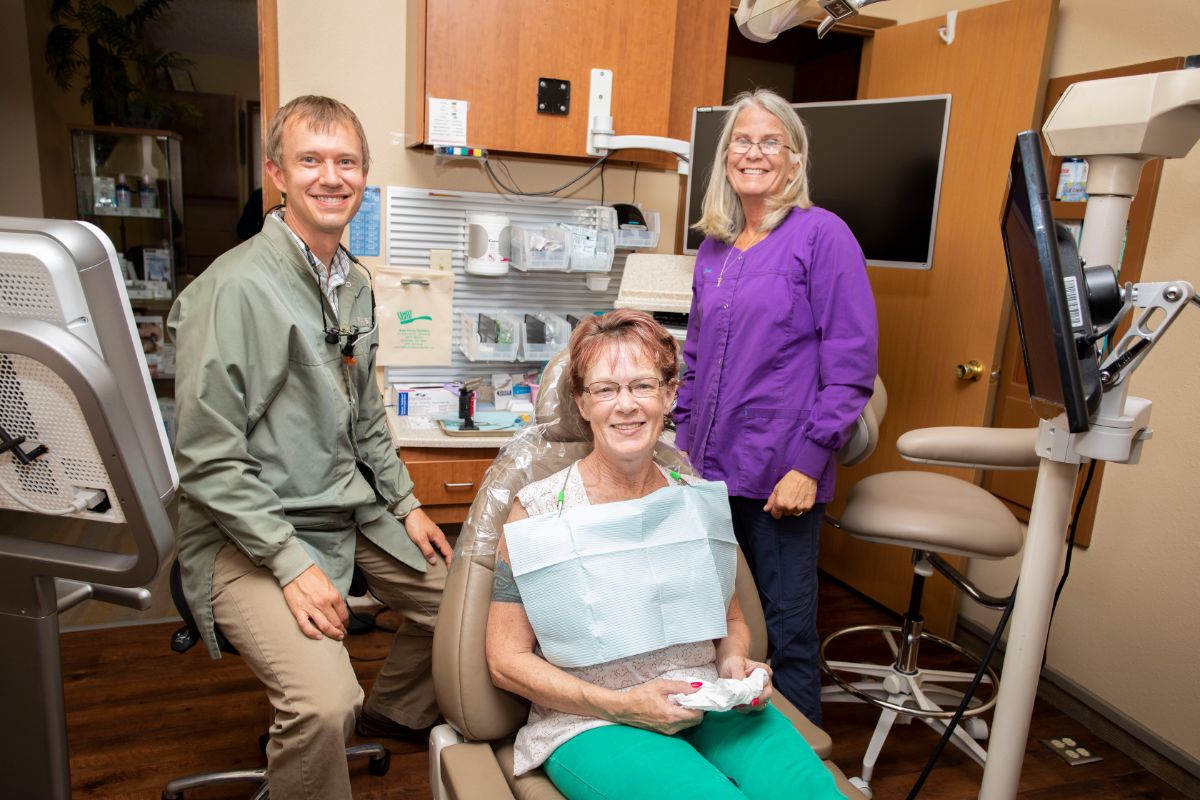Just like every part of your body, as you get older, your mouth changes. Your gums will recede, and teeth will shift and become worn down from wear and tear. You’ll also likely suffer from bone loss, and over the years, side effects of medications will change how your mouth operates.
For many reasons, you probably also have an increased risk of oral cancer, gum disease, dry mouth, and tooth loss.
Our team at Cashmere Family Dentistry wants to help you maintain your oral health for as long as possible. That’s why we have created the following list of our top tips to upkeep your teeth and gums as you age. Let’s take a look!
Are there ways to keep the mouth healthy as you age?
Yes! Fortunately, getting older doesn’t mean you have to accept oral health decline.
Continue to brush and floss every day.
You’ve likely heard this from your parents growing up and from every dental professional you’ve ever seen, and now you’ll hear it from us too! Brushing and flossing twice a day is how we rid the mouth of bacteria, plaque, and germs that can cause tooth decay, gum disease, tooth loss, infection, and other issues. These issues can produce discomfort or pain, which could make eating uncomfortable or wearing dentures unbearable.
We recommend investing in a nice toothbrush. Automatic toothbrushes often have a timer to help you brush your teeth for the perfect amount of time. You’ll want a toothbrush with soft bristles and various intensity settings to brush comfortably but effectively. When you check out the toothbrushes at the store, you might also want to grab some fluoride toothpaste! Fluoride toothpaste is great for protecting the mouth against tooth decay and gum diseases. Ask your dentist if you should incorporate it into your routine.
We suggest water flossers and interproximal brushes for patients who struggle to floss. Water flossers are a great addition to any routine, even if you don’t have difficulty with thread floss. The machines use streams of water to keep the mouth squeaky clean! Interproximal brushes clean between the teeth like floss, and many patients find this easier than thread floss.
See your dentist regularly.
Another crucial step to your oral hygiene is to see us at Cashmere Family Dentistry for your check-ups! These are done once yearly for most patients but are recommended twice a year for older patients.
At these appointments, one of our skilled hygienists will take X-rays of your mouth and professionally clean your teeth. Then Dr. Janie Busk, Dr. Ryan Busk, or Dr. Danielle Harris will examine your mouth and set up a treatment plan with you if necessary.
These appointments are critical to your oral health because they allow you and your dentist to find health complications before they can cause permanent damage to you or your smile.
Prevent or treat dry mouth.
Dry mouth is when the saliva glands cannot produce enough saliva to moisten the mouth. Lack of moisture in the mouth increases your chances of tooth decay and gum disease, digestive complications, difficulty communicating, and pain in the mouth. Dehydration, medications, or illnesses like diabetes can cause this condition.
Ways to prevent and treat dry mouth include:
- changing medications (if possible)
- drinking more water
- using saliva substitutes
- taking prescription medication to increase saliva
- sucking on sugar-free candy or ice to stimulate saliva flow
- use fluoride products with your dentist’s guidance
- Eating softer foods and adding liquids to meals, such as gravy
- Avoid acidic foods and drinks
Monitor how your mouth looks and feels.
No one knows you better than you. Knowing what is normal for you can help you identify stomatitis or dry mouth. It’s important to keep track of how your mouth looks and feels so you can schedule an appointment with us when something isn’t right.
As you are at a higher risk of mouth cancer, it is also necessary that you look for anything abnormal, such as the following:
- sores or lumps in the throat, lips, or mouth
- red or white patches in the mouth
- swelling in your jaw
- have trouble swallowing, chewing, or moving your jaw or tongue
- have pain in one ear but no hearing loss
If you’re experiencing any of these symptoms for two weeks or longer or see or feel anything else out of the ordinary, please contact us immediately.
Knowing what is normal for you can also help you identify stomatitis or dry mouth.
No smoking and avoid alcohol.
Smoking and alcohol cause health concerns for people of any age, but when you’re older with a higher risk of oral cancer and dry mouth, these unhealthy habits could cause some severe damage to your oral health. Talk to your doctor for help to quit smoking and find out how much alcohol is safe for you to drink.
Properly clean your dentures.
Denture care should not be an afterthought to your oral hygiene! Dentures need to be cleaned regularly to be comfortable and safe. Fortunately, there are many denture cleaning products on the market, and denture care takes little time. Be sure to ask your dentist before using any products on your dentures! Once you get the go-ahead, follow the instruction packet closely. Letting them soak for too long can lead to discoloration or damage to the surface of the denture.

Have Questions Or Want Personalized Advice Based On Your Unique Situation? Come See Us At Cashmere Family Dentistry!
We value the relationship we build with our patients and love helping patients of all ages have a good quality of life through oral healthcare.
At Cashmere Family Dentistry, we know that every person’s oral health needs are unique to them, and the best way to receive advice is in person!
Contact us to schedule or request an appointment for personalized oral health tips and product recommendations. We look forward to helping you feel confident and comfortable with your smile!




